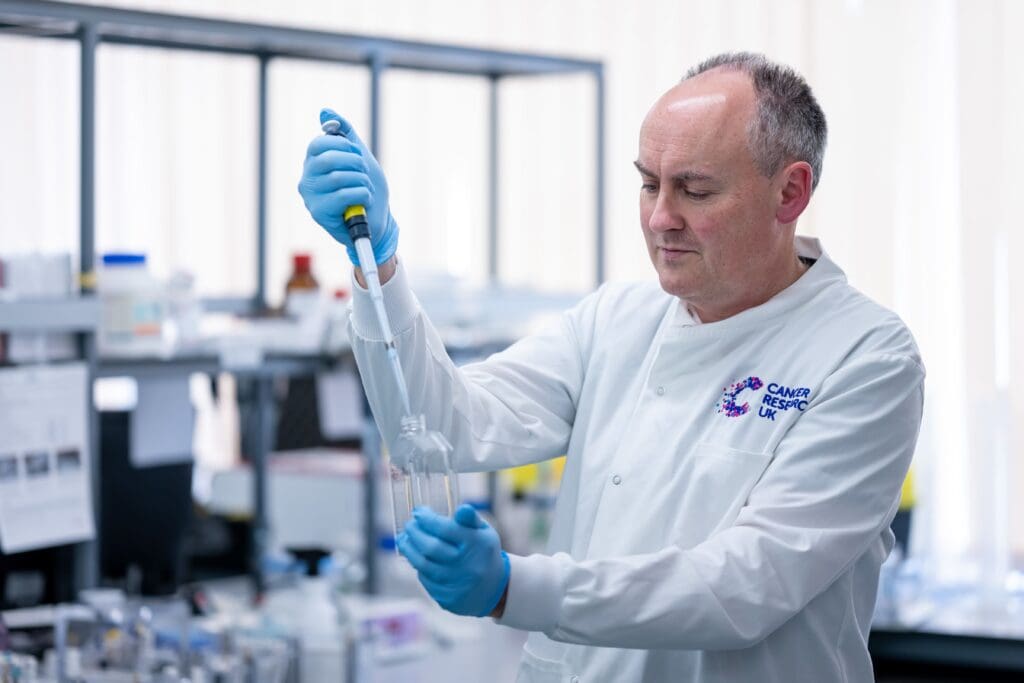A Cardiff University scientist has received £2.1m from the Stand Up To Cancer fundraising campaign to discover better treatments for people with leukaemia.
Professor Steven Knapper and his team are looking at ways to help acute myeloid leukaemia patients (AML) with a genetic mutation called FLT3.
Around a third of people diagnosed with AML carry the FLT3 mutation which is harder to treat and is linked to worse outcomes.
Thanks to funding from Stand Up to Cancer – a joint fundraising campaign from Cancer Research UK and Channel 4 – Professor Knapper’s research seeks to combine chemotherapy treatments with targeted therapies to achieve better results for patients.
Professor Knapper said: “Acute myeloid leukaemia is an aggressive blood cancer and is the most common form of acute leukaemia in adults. This study focuses on a subgroup of AML patients with mutations in the FLT3 gene. These patients have worse overall outcomes due to a higher chance of relapse.
“This research has the potential to make significant strides in improving acute myeloid leukaemia treatment for patients with this specific gene mutation.”
Linda Hurst, who was diagnosed with AML in 2010, has been involved with the research project and praises Professor Knapper’s commitment in helping patients like her.
She said: “I feel honoured to have helped with the trial and it’s fantastic that more effective treatments could be offered to patients in the future.”
Linda was diagnosed with AML when she was 61 after feeling weak, tired and experiencing lots of colds and coughs.
Doctors initially treated the mother-of-four for a bladder infection before Linda was diagnosed with AML.
She said: “I just remember feeling really, really poorly and doctors gave me antibiotics as they thought I had a UTI, which I used to get quite frequently.”
Linda deteriorated and her husband, Andrew, called the GP who came out to their home in Wenvoe, but her illness remained a mystery.
A blood test revealed Linda had a low white blood count and a few weeks later she was diagnosed with leukaemia at Llandough Hospital in Cardiff.
The 75-year-old said “It was a relief to finally get a diagnosis as I knew something wasn’t right. It was a scary time but the treatment and the care I received following my diagnosis was incredible.”
Linda was treated by Professor Knapper who splits his time between being a professor and caring for patients as a haematological cancer lead.
“Steve is a one off. He’s so dedicated to helping patients and I can’t thank him enough for everything he has done for me,” said Linda.
Linda, who has been cancer-free for 14 years, had three rounds of chemotherapy at Cardiff’s University Hospital of Wales.
She said: “Losing my hair and eyelashes was really hard. I would wear the most amazing wigs, but it was something that I found difficult as so much of our identity is associated with our hair.”
Now, grandmother-of-10 Linda, is urging people across Wales to support Stand Up To Cancer to fund more life-saving research.
Linda, who enjoys travelling and spending time with her family and pet sausage dog, said: “I definitely try to live my life to the fullest I’m so grateful for the treatment I received. Success stories like mine would not be possible without research into better and kinder treatments. That’s why I’m lending my heartfelt support to this vitally important campaign. Now is the time for everyone across Wales to Stand Up To Cancer. Every action big or small could make a difference.”
Around 3,100 people are diagnosed with AML in the UK every year.
Over four years, 390 newly diagnosed patients at hospitals around the UK, Denmark and New Zealand will take part in the clinical trial led by Professor Knapper.
Patients will receive up to four cycles of intensive chemotherapy treatment and for some patients, this will also include a stem cell transplant.
Professor Knapper added: “If the trial finds that one of the treatment options is clearly superior to the others, the treatment will be a future option for patients across the NHS.”
With around 19,800 people diagnosed with cancer every year in Wales, the need to make faster advances is clear.*
Stand Up To Cancer takes developments from the lab and accelerates them into new tests and treatments that could help save the lives of more people like Linda.
Since its launch in the UK in 2012, Stand Up To Cancer has raised more than £113 million, funding 73 clinical trials and research projects involving more than 13,000 cancer patients.
Cancer Research UK spokesperson for the Wales, Ruth Amies, said: “This funding award supports the world-leading research that’s taking place in Cardiff which will help people with Acute Lymphoblastic Leukaemia.
“Thanks to our supporters, our scientists are working tirelessly to help more people like Linda survive. From developing pioneering technology using lasers and robots to improve cancer surgery to using AI to optimise radiotherapy treatment for rectal cancer and creating lollipops that could detect mouth cancer, we’re at the cutting edge of research.
“But we must go further and faster. Nearly one in two of us will get cancer in our lifetime.** All of us can help beat it. That’s why we’re asking everyone to Stand Up To Cancer with us. Whether it’s choosing to donate, fundraise, or tackle the ups and downs of our squats challenge, if thousands of us make a stand we’ll speed up the progress of vital research – meaning more people live longer, better lives, free from the fear of cancer.”

